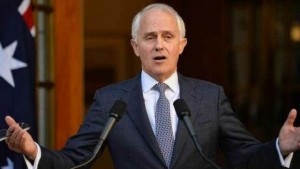Home » Commentary » Opinion » COAG – short for coagulation
· Business Spectator
 The definition of coagulation is to solidify or congeal. That might sum up what we have seen from the meeting today of COAG — the rather unattractive name for the meeting of the Prime Minister with State and Territory leaders. The COAG leaders have indeed solidified their positions, at least in relation to tax and budget management.
The definition of coagulation is to solidify or congeal. That might sum up what we have seen from the meeting today of COAG — the rather unattractive name for the meeting of the Prime Minister with State and Territory leaders. The COAG leaders have indeed solidified their positions, at least in relation to tax and budget management.
For some time the States have complained that they had budget pressures and inadequate revenue, particularly resulting from the $80 billion ‘cuts’ to health and education in the 2014-15 Commonwealth budget.
Rather than improve efficiencies in the delivery of state government services or impose greater spending discipline (the Commonwealth’s preferred solution), the States want the Commonwealth to bear the political pain from increasing taxes and hand over all the additional revenue to the States.
The Commonwealth has indicated that it does not want tax reform just to boost state budgets. Unfortunately all COAG attendees are becoming more solidified in their own positions, leaving little room for flexibility or compromise.
Firstly, on the state budgets. The state budgets are forecast to be drowning in red ink in the near future, primarily due to continuing strong growth in health costs. The states want to shift some of this burden to the Commonwealth. The Commonwealth is unsurprisingly reluctant to facilitate this, particularly with its large budget deficits.
Since the states would find cost cutting politically difficult, this has led them on a quest for additional government revenue. While there is no tax proposal with unanimous support, what little common ground exists among the states is that they need more funds. The tax proposals themselves appear largely incompatible.
New South Wales supports an increase in the rate of the GST with the additional revenue given to the states, which is opposed by Victoria. Queensland and Victoria instead favour raising income tax through an increase in Medicare Levy, yet this is opposed by several states as well as the Commonwealth.
South Australia has come up with a different proposal: the Commonwealth should increase the GST and keep all the extra revenue, while the States get a fixed share of income tax. This innovative idea has a number of difficulties, including a hit to the Commonwealth budget in the longer term (and potentially the short term as well), and the Commonwealth bearing the political cost while getting almost none of the benefit.
Whatever the proposal, the Commonwealth will find it a particularly difficult task to sell the changes as it will either mean the Commonwealth is imposing a large net increase in tax or taking a substantial hit to its (already large) deficit. Under all the proposals from the states, the Commonwealth will take all the political costs while the states get all the extra revenue.
Instead of this approach, if the states decide they want more revenue and are unwilling to reform their spending, a better option is for the states to be given the option of levying a state income tax surcharge. This would at least mean they have to face the political consequences of tax increases. The states have long complained that the Commonwealth raises most of the money and they have to deliver most of the services, so a state income tax surcharge would reduce this imbalance and give them more incentive to consider spending restraint.
Instead, the states are always holding their hands out for more Commonwealth grants, or additional tax revenue, or a bigger slice of the GST pie. There are clear opportunities for greater efficiencies, particularly in the state run health systems.
Unfortunately, it appears that all leaders — State and Commonwealth — are have firmed their positions: everyone else should do spending control except for me. Perhaps instead of setting into their existing positions, the COAG leaders need to de-coagulate.
Michael Potter is Research Fellow in the Economics Program at the Centre for Independent Studies
COAG – short for coagulation